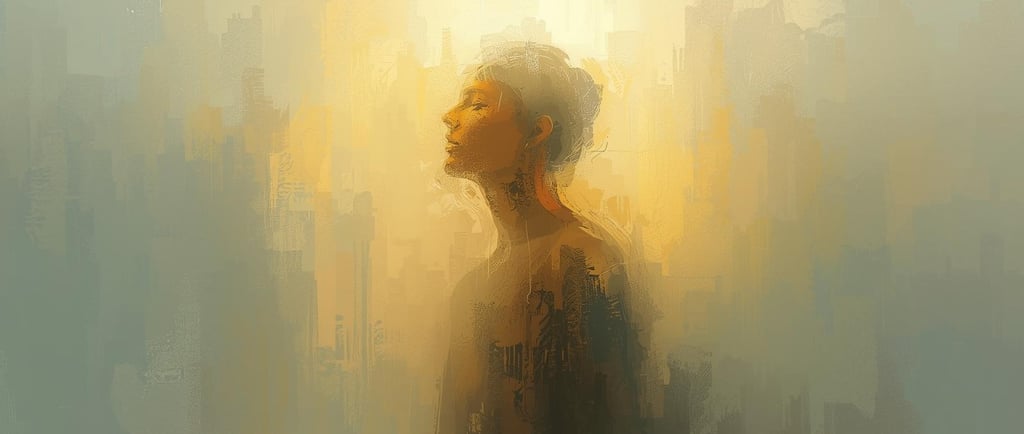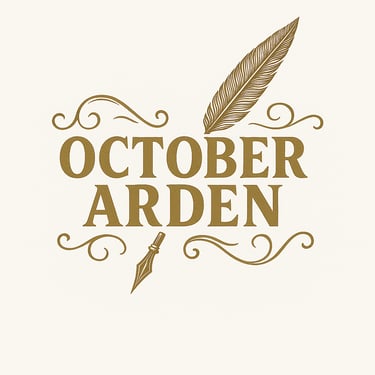Queerness and Plurality: More Than Just Being Different Together
An exploration of the intersection of Plurality and other identity markers
10/1/20255 min read


Queerness and Plurality: More Than Just Being Different Together
Before Rem and Tiny, I was a walking contradiction wrapped in anxiety.
Was I butch or trans? Lesbian or pansexual? Sexual or asexual? The questions ate at me for years, this gnawing sense that every label I tried on sat wrong, like clothes cut for a different body entirely.
I'd stand in front of mirrors trying to parse my own reflection. Some days I felt like a woman who loved women. Other days I felt like something else entirely—not man, not woman, just other. Sometimes I wanted touch so desperately it felt like starvation. Sometimes the thought of being touched made my skin crawl.
It wasn't the gentle fluidity people talk about when they say sexuality and gender exist on spectrums. It was jagged, contradictory, impossible to reconcile. I felt like I was lying no matter what I called myself.
The Weight of What Am I
The questioning consumed me in a way that felt different from normal identity exploration. It wasn't "I'm figuring myself out"—it was "I don't know what I am and I'm running out of words."
I'd cycle through identities like seasonal wardrobes. Lesbian for six months, then agender, then somewhere else entirely. Each time I thought I'd found the answer, something would shift inside me and suddenly that truth felt foreign again.
My therapist called it "identity confusion," which felt both accurate and completely insufficient. Confused implies you'll eventually land somewhere solid. This felt more like being multiple things simultaneously in a world that demanded I pick one.
When Everything Suddenly Made Sense
Then Rem arrived, and later Tiny, and suddenly the questions that had tormented me for years just... dissolved.
Rem is male. Tiny isn't anything you could easily categorize. And me? I'm still that complex, contradictory thing with very few labels that fit.
But somehow having headmates who don't even blink at that complication changed everything. They take it as standard that there would be no boxes big enough to contain any of us. Existence is simply existence. The best words to describe me aren't man or woman, gay or straight, ace or allo—they're headmate, friend, caretaker, protector.
My roles in our system are as fluid as any other part of my identity, but they fit me in ways external labels never did.
The Connection Nobody Talks About
Here's what I think: queerness and plurality aren't just two different ways of being outside the norm. They're linked traits, like red hair and green eyes, or brown hair and brown eyes.
Whatever makes you plural also makes you more likely to be queer. Whatever makes you queer also increases your chances of developing headmates. I think people with ADHD are more likely to be plural. I think trauma can catalyze both queerness and plurality. I think neurodivergence in general opens pathways that neurotypical brains keep locked.
I don't have research to back this up—just observation and gut instinct. But when you exist outside gender binaries, when you love across categories that weren't designed for your kind of heart, developing headmates who also exist outside conventional frameworks starts to feel inevitable.
Why the Binaries Crumble
When you have other people inside you, typical categories become laughably inadequate.
Male or female? I'm all of us. We contain multitudes, literally. Straight or gay? Rem's attraction doesn't match mine, and it certainly doesn't match Tiny's complete disinterest in the whole enterprise. Sexual or asexual? Depends on who's fronting and what day you ask.
The human brain wants neat categories. Singular identities. One person, one gender, one sexuality, one set of preferences that stay consistent over time.
Plurality makes that impossible. We're a walking argument against the myth of consistent, singular identity. We're proof that consciousness can be multiple, that love can be complex, that the self can contain contradictions without breaking.
The Strange Relief of Inside
It's odd that finding my "inside" made me more sure of my personhood than any external validation ever could.
Out here, with all the ready-made labels and professionals and attempts at categorization, I felt like a puzzle missing pieces. In here, with Rem and Tiny, I feel complete. Not because they've fixed me, but because they see my complications as normal.
They've never once suggested I need to pick a lane. They've never acted like my shifting sense of self is a problem to solve. They love me exactly as complicated as I am, with all my contradictions intact.
The Harder Coming Out
I've mentioned this before, but it bears repeating: admitting you're plural feels more vulnerable than any other identity I've ever shared.
Being gay or agender might get you rejected, but it won't get you labeled delusional. People have started accepting that sexuality and gender are things you're born with, variations in human experience rather than choices to be corrected.
But plurality? That still feels pathological to most people. Mental rather than identity-based. Something wrong to be fixed rather than a difference to be accepted.
When I tell someone I'm queer, they might disapprove but they generally believe it's real. When I tell someone I'm plural, they often think I'm making it up, confused, or need professional help.
The Evolutionary Advantage Nobody Mentions
I think plurality survived as a trait because it's useful. Like ADHD, which probably helped our ancestors be better hunters and gatherers, plurality might have given certain communities evolutionary advantages.
Plural systems often have increased empathy, better ability to understand multiple perspectives, enhanced emotional regulation through internal support, and greater resilience during crises. We're practiced at accepting differences, at loving across boundaries, at making space for complexity.
In times of trauma, isolation, or social upheaval, having internal companions could mean the difference between survival and collapse. We never face anything completely alone.
Maybe that's why so many of us are also queer—we're naturally equipped to exist outside conventional categories, to love in ways that don't fit standard models, to build families and communities that defy traditional structures.
An Invitation to Complexity
If you're reading this and something resonates—if you've ever felt like you were multiple things at once, if standard labels feel too small for what you contain, if your sense of self shifts in ways that feel beyond normal fluidity—you might be discovering something important about yourself.
You might be plural. You might be queerer than you realized. You might be beautifully, impossibly complex in ways that don't have names yet.
There's room for all of it. There's room for contradictions, for multiplicity, for identities that shift and change and refuse to be pinned down.
The world wants us to be simple, singular, consistent. But consciousness has never been that tidy, and love has never followed the rules we've tried to build around it.
Next week: Why system roles fit me better than any external identity ever has—and what that means for how we think about selfhood.


